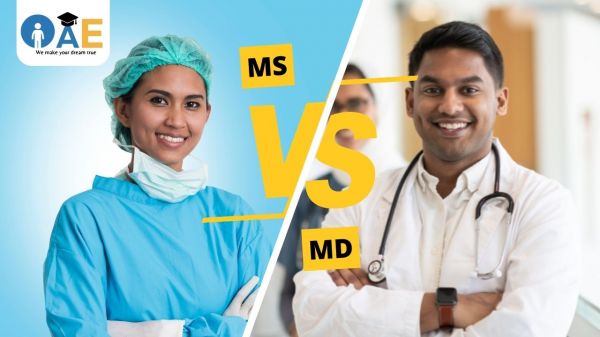So, after earning your MBBS, you want to enrol in a speciality course. Having trouble deciding between an MD and an MS following your MBBS? Continue reading!
You are exposed to many different areas of surgery and medicine while pursuing an MBBS degree. It is a bachelor’s degree programme that provides the best knowledge of several specialities. To become a surgeon or specialist, however, medical professionals and students must complete a specialisation programme after earning their MBBS. While the specialist will diagnose, medicate, treat, and cure his or her patients’ illnesses, you as the surgeon will handle the tools required for surgery.
Doctor of Medicine (MD) or Master of Surgery (MS) degrees are required to become a specialist or surgeon, respectively. We will compare MD and MS in this article to assist you in making the best choice. If you are still unsure whether you should enrol in a post-MBBS course or not, the following section should help.
Why Should You Enroll in a Postgraduate Course Following MBBS?
To succeed in the medical field, Indian doctors must specialise by enrolling in a PG programme after completing their MBBS degree. The completion of specialisation does, however, hold some glaring contradictions. After earning your MBBS, you can advance your profession and earn more money if you pursue MS or MD programmes.
Let’s examine the distinction.
Demand
It goes without saying that you are in greater demand in the healthcare industry as a post-graduate medical expert. No patient would choose to see an MBBS graduate for a health issue relating to dermatology. They would look for an MD-educated specialist.
Can you envision the impact that an MD from India may have?
Job Prospects
MBBS has good employment potential, but you also need to have specialised knowledge in a certain area. You will succeed in the healthcare sector even if you are only an MBBS graduate. Nonetheless, you develop the best diagnosing abilities, confidence, responsibility, and improved communication skills with thorough knowledge of the subject, such as MS in OBG.
As a result, after earning an MBBS, your career graph would undoubtedly follow an upward trend with specialisation through an MD or MS.
A doctorate in MBBS qualifies one to practise medicine. In India, you can become a skilled specialist or surgeon with an MS or MD.
Salaries of Physicians with Post-MBBS Training
Also, the wage range varies greatly. An MBBS graduate may earn anywhere from INR 30,000 per month to more than that, typically up to INR 1 lakh, just like in the majority of other fields. However, the salary for an MD in India is INR 2–20 lakhs, and the salary for an MS is INR 4–35 lakhs.
Which Is Better, MD or MS?
In general, the greatest course to take depends on your ability, interests, and talents. When deciding between MD and MS or fluctuating between the two, you should take into account things like your skills, potential job paths, etc.
You may spend a lot of time working with blood and human tissue if you pursue MS after earning your MBBS. Don’t think of MS after MBBS if you can’t handle cuts and excessive amounts of blood.
Similarly to that, the greatest option for an MD in India in general medicine. Your job as a specialist would involve recommending medications and treatments to patients. You wouldn’t deal with machinery or equipment all that frequently in this line of work, and you would communicate directly with patients.
MD versus MS: A Comparison of the Differences
If you’re attempting to map the differences between MD and MS, we’ve outlined some key elements below. Discover the best post-MBBS course by reading on.
Therefore, let’s define both MS and MD in India first before moving on.
A post-MBBS course called MD in India might help you learn in-depth information about a particular area of medicine. You get the capacity to diagnose patients more properly via this research so that you can provide them the appropriate treatment at the appropriate time. The following specialisations are available in this field:
- MD Paediatrics
- MD General Medicine
- MD Pathology
- MD Radiology
- MD Cardiology
- MD Dermatology
- MD Neurology
- MD Neonatology
- MD Oncology
- MD Gastroenterology
MS after MBBS is also a post-MBBS course that helps you receive deep knowledge in the field of surgery. This field includes patient care, seminars, clinical discussions, hands-on clinical experience, and supervised surgery. An MS after MBBS includes the following specializations:
- MS Orthopaedics
- MS OBG
- MS Ophthalmology
- MS ENT
Demand
Without a question, earning an MD or MS after receiving an MBBS helps you develop specific skills that enable you to treat patients effectively. You acquire the knowledge necessary to investigate novel health problems, appropriately identify patients, and prescribe the best treatment options. In India, there is a need for both MS and MD graduates. You must select the area of study that best appeals to you.
Eligibility
In India, obtaining an MD requires two to three years of full-time study with costs up to INR 15 lakhs.
After MBBS, you must complete a 3-year full-time degree programme at a cost of up to INR 10 Lakhs in order to pursue an MS.
An MBBS degree from any college approved by the MCI is required for both the MS and MD programmes in India. To pursue a specialisation in MD or MS, you also need to have passed NEET or any other exam.
Specialization
After MBBS, there are a few specialisations in MD and MS that have already been covered. This is a comprehensive list of specialisations you can pursue in India while earning your MS or MD.
| MD vs MS Specializations | |
| MD Specialties | MS Specialties |
| Gynaecology or obstetrics | ENT |
| Anaesthesiologist | Urology |
| Orthopaedics | Plastic surgery |
| Neurology | Paediatric surgery |
| Endocrinology | Cardiothoracic surgery |
| Cardiology | Cardiac surgery |
| Gynaecology | Ophthalmology |
| Paediatrics | Cosmetic surgery |
| Internal medicine | Obstetrics |
| Psychiatry | Gynaecology |
| Pathology | Orthopaedics |
| Radiodiagnosis | |
| Dermatology | |
Job Prospects
The job prospects are one of the most important MD vs MS comparison factors. Following MBBS, you have an equally rewarding career graph in both MD and MS. Your aptitude, talents, and experience are ultimately what will determine your success. Your job chances depend on the concentration you choose in post-MBBS courses, regardless of the degree you ultimately choose.
Overall, your job prospects are strong in both sectors.
You should keep in mind that since a surgeon has previously earned his or her MBBS, they can treat patients for several common illnesses other than surgery. A general practitioner or any other expert, however, cannot practise surgery without the necessary education and training.
Salary Scale
The wage range of both professions is another important decision element when comparing MD and MS. You can earn between INR 2 and 20 lakhs and between INR 4 and 35 lakhs in India as an MD or MS, respectively. You might receive an initial salary of INR 30,000–60,000 if you decide to work as a teacher.
How to Pursue Post-MBBS Courses
We’re certain that by this point you’ve decided what you want to study after your MBBS. This is why the next parts cover how to pursue an MD or MS after completing an MBBS. Find out how to pursue an MD or MS the best way possible.
Completing MS or MD in India
It is difficult to complete an MS or MD in India. After completing your MBBS, you must take the NEET PG exam, which stands for National Eligibility and Admission Test for Medical Postgraduate Programmes. Your post-MBBS course will be available for selection during counselling once you have taken the exam and passed it.
This path requires effort. As an example:
In India, there are only a few available PG seats. The one you want can be difficult for you to get.
After MBBS, you might not receive your selected speciality even if you are able to secure a seat for MD or MS.
Conducting tests
The DNB or Diplomate of National Board are alternatives to the NEET PG test. You might think about a number of niche professions after earning your MBBS by specialising in DNB. Problematically, very few people pass the exam and enrol in a course because it is challenging to pass.
Conclusion
There is a need in the medical industry for trained specialists. After receiving an MBBS, pursuing post-graduation offers good professional advancement and high compensation. Paediatrics, neurology, radiology, cardiology, dermatology, and other specialities are included under the general medicine areas that an MD concentrates on when writing prescriptions for pharmaceuticals and treatments. As opposed to MS, which has specialities in orthopaedics, obstetrics, ophthalmology, ENT, etc., where you will be exposed to blood and human tissue.
Are you medical counselling in need of assistance with your studies? You can get there with our assistance!
To assist medical students in succeeding, Admission Experts offers expert medical education consultancy. You will receive individualised coaching from our skilled team of advisors to help you choose the best tactics for achieving your objectives. We can assist you in examining the many medical education options, creating a personalised strategy to take full advantage of your academic and professional prospects, and directing you towards the most helpful resources.
Since they are authorities in the medical sector, our advisors can ensure that you get the most out of your medical training. We will give you the resources and tools you require to succeed.
To learn more about our services and how we can assist you in achieving your goals, get in touch with us right away.


